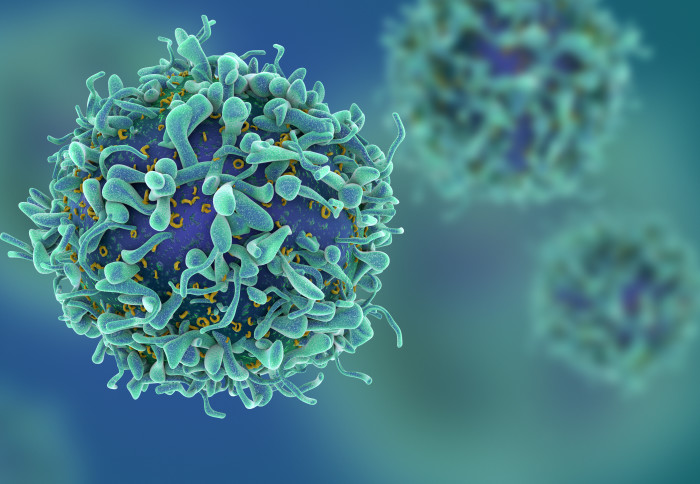World Cancer Day 2021

To coincide with World Cancer Day, we look back at how Imperial College London has been leading the fight against cancer in the past year.
Prof Axel Behrens is new Scientific Director of CRUK Convergence Science Centre
Prof Axel Behrens, a pioneer in building collaboration across research fields, joined the Cancer Research UK Convergence Science Centre as Scientific Director.
 The Convergence Science Centre is a major strategic partnership between the ICR and Imperial. It will provide a paradigm-shift in cancer research by bringing together traditionally separate and distinct disciplines – such as biological, computational, physical, and engineering sciences – into collaborative, integrated research teams, that will shed light on unresolved problems in cancer biology and bring innovative treatments to cancer patients faster
The Convergence Science Centre is a major strategic partnership between the ICR and Imperial. It will provide a paradigm-shift in cancer research by bringing together traditionally separate and distinct disciplines – such as biological, computational, physical, and engineering sciences – into collaborative, integrated research teams, that will shed light on unresolved problems in cancer biology and bring innovative treatments to cancer patients faster
MRI tool can diagnose difficult cases of ovarian cancer - 30 January 2020
Researchers have developed a new MRI tool that can identify cases of ovarian cancer which are difficult to diagnose using standard methods.
The tool has produced encouraging results in a clinical study and its impact on management and outcomes of women with ovarian cancer will now be evaluated in a major trial at 18 hospitals in the UK, including Imperial College Healthcare NHS Trust.
Artificial intelligence could help to spot breast cancer
 A computer algorithm has been shown to be as effective as human radiologists in spotting breast cancer from x-ray images.
A computer algorithm has been shown to be as effective as human radiologists in spotting breast cancer from x-ray images.
The international team behind the study, which includes researchers from Google Health, DeepMind, Imperial College London, the NHS and Northwestern University in the US, designed and trained an artificial intelligence (AI) model on mammography images from almost 29,000 women.
Text message reminders boost cervical screening uptake
In a study of almost 15,000 women in Northwest London, SMS reminders increased cervical screening participation by around 5%. Based on these findings, the NHS rolled out text message reminders across London in late 2018 for a 6-month trial period, which saw a similar rise of 4.8% in cervical screening uptake. That is the equivalent of 13,400 more women being screened as a result of the campaign.
New anti-cancer drug combo treatment shows promise for myeloma patients
 Phase 3 trial results reveal that selinexor – a relatively new anti-cancer drug – improves patient outcomes when combined with established treatments.
Phase 3 trial results reveal that selinexor – a relatively new anti-cancer drug – improves patient outcomes when combined with established treatments.
A weekly regimen of selinexor in combination with bortezomib and dexamethasone reduces the risk of disease progression or death by 30 per cent in patients with multiple myeloma, according to findings published today in The Lancet.
Imperial set to lead UK trial of innovative new cancer drug
The new trial will assess a promising new drug developed by Imperial scientists, designed to treat multiple myeloma and diffuse large b-cell lymphoma.
Cancer drug discovery technologies get a £4.5m boost
 Imperial academics will lead a project to improve imaging technologies for cancer drug discovery, funded by CRUK and European partners.
Imperial academics will lead a project to improve imaging technologies for cancer drug discovery, funded by CRUK and European partners.
The project aims to improve screening for new cancer drugs. Currently, drugs are typically tested using conventional microscopy to image thin layers of cancer cells. However, this approach does not reflect the true complexity of cancer inside people.
In an analysis of 15 research studies involving more than 3,000 patients around the world, researchers found that cancer patients who contracted COVID-19 had a 23 per cent risk of mortality compared to non-cancer patients with COVID 19 who in the study had a less than six per cent risk.
New Unit to advance cancer prevention research and strategies
 The Cancer Epidemiology and Prevention Unit (CEPRU) is a joint initiative between Imperial College London and The Institute of Cancer Research. Its vision is to be a global leader in advancing research on the causes of cancer and implementing effective primary prevention strategies through collaborations.
The Cancer Epidemiology and Prevention Unit (CEPRU) is a joint initiative between Imperial College London and The Institute of Cancer Research. Its vision is to be a global leader in advancing research on the causes of cancer and implementing effective primary prevention strategies through collaborations.
Article text (excluding photos or graphics) © Imperial College London.
Photos and graphics subject to third party copyright used with permission or © Imperial College London.
Reporter
Benjie Coleman
Department of Surgery & Cancer